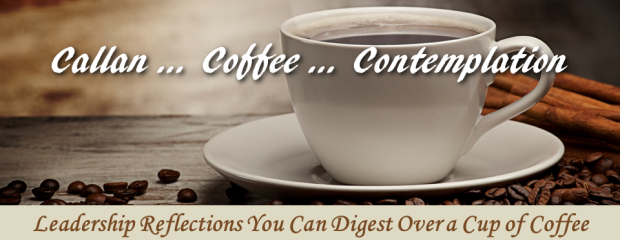Callan…Coffee…Contemplation for the Week of January 12th
Illumination
Great leaders are beacons; they illuminate the present realities while also shining light on the path to future end states. And the source of their illumination, burning at high candle power, is their self-leadership and self-mastery. Great leaders are able to take a flickering light from the past, turn it into a flame, which in the future shines across the broad trajectory of possibility. Conversely, poor leaders possess no such inner illumination. Poor leaders lack self mastery, and as such they act instead as black holes, absorbing into themselves any positive spirit and or any elevating purpose. Illumination simply cannot escape a poor leader’s negative gravitational pull. The light we emit as heroic leaders is meant not for our own use, but to light the way for others. The question we must therefore always ask ourselves is this: Are we generating illumination?
All Hat, No Cattle
I recently re-watched one of my favorite movies —The Outlaw Josey Wales. Whatever one feels about the fictional character Wales, he was certainly a person who “walked the walk” and didn’t simply “talk the talk.” This reminds me of a timeless truth of leadership and excellence: action and substance matter more than words and pretenses. Heroic leaders are committed to meaning, and project their high purpose through a compelling vision. More importantly, they execute their vision through right action. Conversely, poor leaders often fake high purpose through superficial means and thin gestures and never complete their goals because they fail to take action. Poor leaders are like the city slicker who wants to be seen as an authentic cowboy; they are all hat, no cattle. Heroic leaders, via real tests and trials and a commitment to authentic living, learn to actually become a cowboy. Great leaders, like the fictional Josey Wales, walk the walk as people of substance and authenticity.
Rule Shows the Man
Aristotle often quoted the Greek proverb, “Rule shows the man,“ which means: No one knows with certainty how virtuous—or corrupt—a person might be until he holds office and has power. This has great relevance to leadership as I have long thought the greatest window of a leader’s true character, their real self, is to see them at either their lowest or highest points. It is during these two extremes, depression and elevation, where the external pressure is high enough to strip away any false masks and reveal the true nature of a person. Great leaders, ones possessing self mastery, actually become better—more virtuous—in times of loss or victory. They are the same person with or without power. Weak leaders, on the other hand, because they lack self mastery, become more vicious and bankrupt when they either lose or gain power. The greatest test of a leader, the real litmus test of heroic character, is what one does with power.
Wilderness Years
What becomes clear when studying heroic leaders from the past, almost without exception, are periods in their lives of loss and retreat from the lime light. I think of these phases as wilderness years; stretches of time characterized by feeling off track, discouraged, and beaten. Presidents Teddy and Franklin Roosevelt, Churchill, King, Lincoln, Gandhi—they all had wilderness years. And what is clear in studying these people, with the aid of retrospect, is this truth: The wilderness years transformed them and defined their greatness. It is during times of loss when leaders often feel enough pain to finally welcome the break, which then leads to the breakthrough. It is as if the wilderness periods, much like an abyss, provide a defining moment, an internal crucible, able to either destroy or transform the individual. I have found myself likewise in such wilderness years as I look back across the arc of my life, and I now realize these wilderness times are often the greatest periods for growth and renewal.
The Only Time to Give In
I often reflect on the necessity of resilience in pursuit of heroic leadership because I see a resolute character, both personal and organizational, to be central to enduring excellence. I cannot find one historical example of supreme achievement or lasting significance not built up by, and sustained through, deep reservoirs of resolve. Think here of Winston Churchill as he exhorted his countrymen during WWII with these words: “Never give in. Never give in. Never, never, never give in.” However, in contemplating this admonition, I do believe there is one circumstance when leaders should give in: In response to Honor’s call. We give in by hearing honor’s voice and by giving over to the better angels of virtue. So yes, we must remain resolute and determined to achieve excellence; but equally, we must occasionally give in by not only hearing, but also answering, honor’s call.
Check back next Monday for a round up of this week’s social media shares. Or check us out on Facebook, Twitter, Google+, or Pinterest to see our posts every day!
Tweet Share






